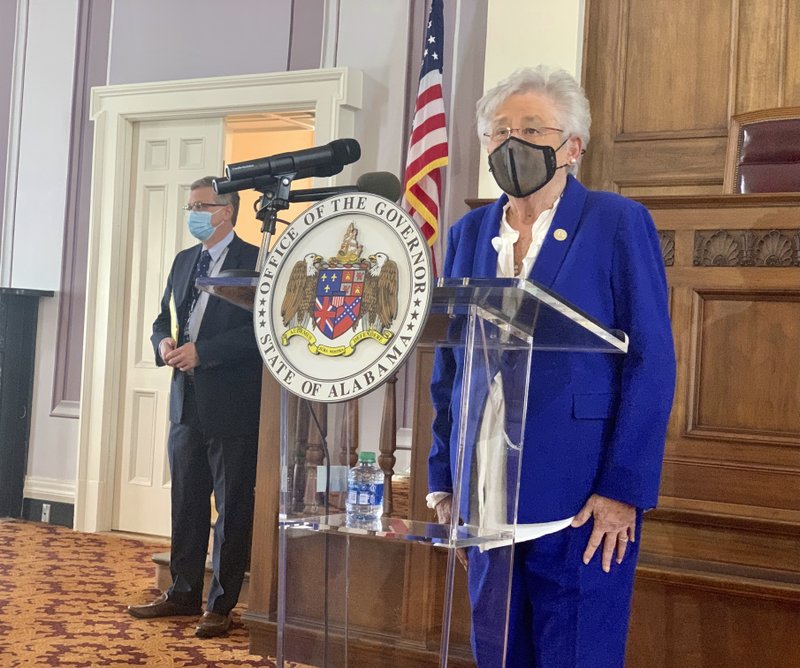Napoleon Bracy selected for highly competitive Stacey Abrams Fellowship

Alabama State Rep. Napoleon Bracy has been selected to the Stacey Abrams Fellowship. The highly competitive fellowship recently added five states to its fellowship program. This year, the program will include South Carolina, Tennessee, Alabama, Mississippi, and Louisiana. Founded by Georgia politician Stacey Abrams, Fair Fight is a voting rights group that has been devoted to expanding knowledge and awareness of issues like voting rights, legislative functionality, and grassroots advocacy. Until now, the group has focused on developing a cohort of elected officials in the state of Georgia. Starting this year, Fair Fight will work with partner organizations on the ground in five additional states to select state legislators to become Senior Fellows. The program will last two months and culminate in a joint graduation ceremony with the Georgia Senior Fellows and keynote speaker Stacey Abrams in December 2021. In a February op-ed in the NYT written by Abrams and Lauren Groh-Wargo titled “How to Turn Your Red State Blue, Abrams wrote, “The steps toward victory are straightforward: understand your weaknesses, organize with your allies, shore up your political infrastructure and focus on the long game.” She concluded the piece, saying, “Our approach was rooted in the demographic numbers and in the moral clarity provided by an authentic, multiracial, multiethnic, multigenerational and truly statewide coalition.” “People often write off the South as a place where elections and fights for progressive values are unwinnable—but we’re proving that the South is ground zero for the next wave of progressivism in this country. Through the Fair Fight National Fellowship Program, we will continue to support and develop the next generation of strong progressive leaders across the South,” said Fair Fight Political Director André D. Fields. One of Alabama Today’s most influential people of 2021, Bracy was elected to the Alabama State House of Representatives in 2010. Representing Mobile, Alabama, he was elected as Chairman of the Alabama Legislative Black Caucus in 2013. Bracy is the Manager of Diversity, Inclusion, and Affirmative Action for Austal USA, a defense contractor for the US Department of Defense. Bracy posted on Facebook, “I am proud to be selected as a Fair Fight Action Fellow with Stacey Abrams along with other southern legislators fighting for better access to the ballot box! Let’s turn Alabama Blue! We are learning from the best!”
32 Powerful and Influential Alabamians to know

It’s true, the words “powerful and influential” can be vague and subjective. However, it’s fair to say among the universally accepted definitions within politics and policy is an individual’s ability to create change, start a conversation, influence the public or public officials, move an agenda forward or stop one in its tracks. There’s no doubt that a good number of people are moving Alabama forward in politics and business. Recently, Yellowhammer published its 2021 annual list of who they consider the most influential and powerful. They noted it was a “Peek behind the curtain.” That it always is – a peek into the mind of the editorial team, writers, and friends of the site. With the same people on it year after year, often in the same companies and offices and the standard members of the legislature and statewide offices. Dozens of whom certainly would belong on any list of power or influence: Jo Bonner, Katie Britt, Bob Geddie, Dax Swatek. No one can deny the influence any of them have. Others on the list begged the question “Why?” while others were glaringly missing. This list purposely does not duplicate any name already appearing on that list. Not all influencers within the public arena are lobbyists or lawmakers. Some within the media or in advocacy organizations can shape or change public opinion. In addition, some influencers have the ability to position themselves, loved ones, or friends to the front of the line for coveted appointments or jobs. There’s so much to power and influence; while it may hard to describe, you know when you see it, and you know who lacks it. It could be argued that 1-5 are no brainers and would be list repeats, but heck, I say repeat them until it changes. So with that, let Alabama Today offer 32 additional notable people who were nominated by a ragtag group of incredibly biased judges. Did I mention how incredibly biased we are? This, combined with the YH list, might give one a better view of the movers and shakers with power and influence in the state’s political world. Worth noting, some of them are the bosses, mentors, elders statesman, and wise counsel of many on the YH list, while a couple of others are up and comers. Jimmy “Yellow Fella” Rane, President/CEO at Great Southern Wood Preserving Not only is the Yellow Fella the wealthiest man in Alabama and Board of Trustee at Auburn, but there’s also no doubt he’s used his financial success to the betterment of the state, giving him great power and influence. His contributions are well documented, politically, economically, and through philanthropy. From 2013 to May 2021, his company has given 178 contributions totaling $2,079,316.40. He also has the Jimmy Rane Foundation, which has more than doubled his political donations with $4.7 million in scholarships. His influence is undeniable and unmatched, which is why he is number one on our list. Mark Crosswhite, CEO Alabama Power Crosswhite’s voice carries a lot of weight, so much so that multiple people on the YH list answer to him in one way or another. Which begs the question, how can anyone deny his place on any list of power and influence? He chaired the BCA board during a critical time when the organization’s future was in peril, saving a key organization critical to the state’s business development, growth and success, and ensuring a better economic future for the state. As the organization continues to grow and evolve, there’s no doubt he’s still helping steer the ship. 3. Fess St. John IV, Chancellor of The University of Alabama System Finis “Fess” St. John IV comes from a storied line of Alabama influencers, including his father and grandfather. He’s currently the Chancellor of The University of Alabama (UA) System. Which makes him the chief executive officer of Alabama’s largest employer with multiple school campuses and a massive healthcare system. According to the school’s website, “Total enrollment in the UA System achieved a new record this fall, with more than 70,400 students enrolled at UA, UAB, and UAH. The System’s annual economic impact surpasses $10 billion annually, and upwards of 1.7 million patients are served every year in the System’s hospitals and clinics.” 4. Chris England, House of Representatives, District 70 While many have tried over the last couple of decades, England was able to stop the further deterioration of the Democrat party (with a reputation that was nationally marred by chaos, a lack of structure, oh, and that one toilet story) and begin its rebuilding. One long-time democrat described the infrastructure as stronger now than it has been since the days of Bill Baxley. England is a graduate of Howard University and the University of Alabama School of Law. His father grew up in Circuit Court Judge John H. England Jr., who served as a justice on the Alabama Supreme Court in 1999-2000. To leave him off the Top 5 of any influential list is to deny reality. 5. Stephanie Bryan, Tribal Chair and CEO for the Poarch Creek Indians No one should question the top female on this list. It’s no coincidence that she heads one of the biggest political powerhouses in the state of Alabama. PCI has capitalized on the shift in public attitudes towards a more tolerant attitude towards gaming and lottery to push for changes in the law that would allow their tribe’s operations to grow. This session’s gaming proposal wasn’t successful, but it got further than expected and may come up again in a special session. She is a political player that many say could be the most powerful over the next couple of campaign cycles. 6. Tom Coker, The Southern Group Rare can someone survive with the longevity and respectability of Tom Coker. His strength is the state senate, but he can get things done. His firm’s website names him as President of Tom Coker & Associates since 1982. Tom Coker offers a full range of governmental
Bill to ban transgender athletes passes House

Alabama could become the next conservative state to prevent transgender girls from playing on female sports teams as the state House of Representatives on Thursday approved the legislation. Representatives voted 74-19 for the bill that will require K-12 athletes to play on teams based on the biological sex listed on their birth certificates. The approval came after Republicans voted to end a filibuster. The bill now moves to the Alabama Senate. More than a dozen states are considering restrictions on transgender athletes or gender-confirming health care for transgender minors. Mississippi Republican Gov. Tate Reeves last week signed a bill to ban transgender athletes from competing on girl’s or women’s sports teams. However, South Carolina lawmakers this week rejected a similar bill. “It is unfair for biological males to compete against females in high school sports,” Republican Rep. Scott Stadthagen of Hartselle said as debate opened on the bill. Alabama legislators who pushed the bill gave no evidence of any transgender athletes competing in state schools or universities. Democratic legislators questioned the need for the bill, saying the decision should be left to athletic associations and lawmakers shouldn’t get involved. Democratic Rep. Napoleon Bracy of Prichard asked “what happened” to make the legislation a priority in the Alabama Legislature, noting that lawmakers could not point to instances in the state of transgender athletes dominating sports. Rep. Mary Moore, a Democratic representative from Birmingham, expressed concern about the impact on transgender youth and said lawmakers were trying to insert themselves into these decisions. “As a body, we are trying to practice medicine without a degree,” Moore said. Supporters of the bills say transgender girls are born bigger and faster and have an unfair advantage in competition. Opponents say the bills are rooted in discrimination and fear and violate the federal law barring sex discrimination in education. Republished with the permission of the Associated Press.
Lawmakers approve virus liability legislation

Alabama lawmakers on Thursday gave final approval to a bill the would shield businesses, health care providers and others from lawsuits from employees and customers who claim they were exposed to COVID-19. The bill would shield businesses, schools, health care providers, churches and others from lawsuits over COVID-19 exposure and treatment unless the person could prove the entity was acting with reckless or intentional misconduct. The House of Representatives voted 86-4 for the bill. It now moves to Alabama Gov. Kay Ivey for her signature. Ivey had named the bill — along with a bill to exempt coronavirus relief funds from state sales taxes and a third to renew the state’s pool of industrial recruitment incentives — as the top priorities for the first two weeks of the legislative session. Republican Rep. David Faulkner of Mountain Brook said the bill will discourage baseless lawsuits but not protect “bad actors” who recklessly ignore precautions. “This is going to give the protection to people, to these businesses, to these workers to get back out there without fear of needless lawsuits or really lawsuits that shouldn’t be filed,” Faulkner said. Rep. Napoleon Bracy, D-Prichard, said he supports the bill but is concerned the immunity will encourage conspiracy theorists and irresponsible people to continue to disregard COVID-19 precautions. He described how his family was infected because of people repeatedly flouting mask orders. “Families are being impacted, just like mine,” Bracy said. “We are about to vote to continue to protect them.” Republished with the permission of the Associated Press.
House passes limit to cities’ ability to levy occupational taxes

The measure comes as the city of Montgomery explores the possibility of creating a 1% occupational tax.
Mobile delegation opposes amendment to allow vote on minimum wage hike

The House Committee on Mobile County Legislation met Wednesday to discuss a slew of local legislation, including HB248 from Rep. Napoleon Bracy (D-Mobile). The constitutional amendment would allow Mobile citizens to vote on whether or not to raise the county’s minimum wage to $10.10 an hour. Bracy brought forth the bill in the form of a constitutional amendment in order to skirt around legislation passed earlier this session. HB174 from Rep. David Faulkner (R-Birmingham), also known as the Alabama Uniform Minimum Wage and Right to Work Act, was filed to thwart efforts by the Birmingham city council to gradually raise that city’s minimum wage to $10.10 an hour over three years. After being signed into law by Gov. Robert Bentley, the bill effectively bars in Alabama city or county from raising its minimum wage. If passed, the amendment would have been voted on by Mobile County voters in the upcoming November election. At the time of the committee’s vote Wednesday, eight committee members were present. The four representatives who voted against the bill, causing voting to end in a tie and causing the bill to gain an unfavorable report, were Reps. David Sessions (R-Mobile), Victor Gaston (R-Mobile), Margie Wilcox (R-Mobile) and Jack Williams (R-Mobile). The four Democrats on the committee voted in favor of the measure. Because of its failure to garner a favorable report in the committee hearing, the bill will not be heard by the full House of Representatives.
Alabama legislative preview: March 21 – March 25, 2016

The Alabama House of Representatives will convene at 1 p.m. Tuesday, and the Senate an hour later, as state lawmakers gather for the 17th day of the regular session. This week, the Senate will take up SB89 from Sen. Arthur Orr (R-Decatur), which would require Alabama public school students to pass a civics test as a requirement for graduation. Orr’s legislation has been on the agenda for a while, but has likely been stalled due to a focus on more contentious issues. The body is also slated to take up SB148 from Sen. Jim McClendon (R-Springville), which would require all vehicle passengers to wear a safety belt, and SB114 from Sen. Paul Sanford (R-Huntsville), which would regulate fantasy contests and “exempt fantasy contests from certain criminal penalties associated with gambling activity.” The bill would increase spending by the Attorney General’s office, which would be responsible for overseeing such activities, by $1 million in the first year. Also on the Senate’s agenda this week are SB14 from Sen. Gerald Allen (R-Tuscaloosa), which would allow citizens to carry a firearm in their vehicle without a permit, and SB205 from Sanford, which would bar the Alabama Department of Human Resources from renewing health center licenses for an “abortion clinic or reproductive health center” within 2,000 feet of a school. In the House, lawmakers will take up HB46 from Rep. Alan Boothe (R-Troy), which would allow Alabama spirit makers to sell fifths for off-premise consumption. The body is also slated to debate HB13 from Rep. Alan Harper (R-Northport), which would allow citizens to vote on whether or not to allow a lottery in the state – the legislation provides no details on how proceeds from such an operation would be used, which is likely why it hasn’t been discussed thus far. HB218 from Rep. Dickie Drake (R-Leeds) is also on the agenda and would require that all elementary school students be instructed in cursive writing before the end of their third grade year. HB244 from Rep. Connie Rowe (R-Jasper) will also be taken up this week – the bill prohibits law enforcement from requiring victims of a sexual offense to take a polygraph examination. Committee hearings get underway Tuesday, though the vast majority take place on Wednesday, beginning with the Senate Judiciary Committee, which will take up SB237 from Sen. Quinton Ross (D-Montgomery). Ross’s legislation would make it unlawful for employers to request information regarding arrests and convictions on employment applications. The committee will also take up Sanford’s SB115, the Senate version of “Leni’s Law” from Rep. Mike Ball (R-Madison), which would decriminalize possession of the marijuana-based medicine cannibidiol. The Senate Committee on Constitution, Ethics and Elections will debate SB360 from Sen. Tom Whatley (R-Auburn), which would require voters to register as a Democrat or Republican before voting in a primary. Voters who do not will not be allowed to vote on party candidates, only on ballot measures and nonpartisan issues. The House Committee on Agriculture and Forestry will take up HB393 from Rep. Ken Johnson (R-Moulton), which would allow for the growing of industrial hemp in the state for use in a variety of products. The House Committee on Mobile County Legislation will mull over HB248 from Rep. Napoleon Bracy (D-Mobile), which would establish a $10.10 minimum wage in Mobile County. At the close of business this week, legislators will adjourn for spring break.


